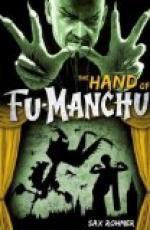“But, Smith, why did you direct me to-night to repeat the words, ’Sakya Muni’?”
Smith smiled in a very grim fashion.
“It was after the episode I have just related that I made the acquaintance of that pundit, some of whose statements I have already quoted for your enlightenment. He admitted that the Flower of Silence was an instrument frequently employed by a certain group, adding that, according to some authorities, one who had touched the flower might escape death by immediately pronouncing the sacred name of Buddha. He was no fanatic himself, however, and, marking my incredulity, he explained that the truth was this;—
“No one whose powers of speech were imperfect could possibly pronounce correctly the words ‘Sakya Muni.’ Therefore, since the first effects of this damnable thing is instantly to tie the tongue, the uttering of the sacred name of Buddha becomes practically a test whereby the victim my learn whether the venom has entered his system or not!”
I repressed a shudder. An atmosphere of horror seemed to be enveloping us, foglike.
“Smith,” I said slowly, “we must be on our guard,” for at last I had run to earth that elusive memory. “Unless I am strangely mistaken, the ‘man’ who so mysteriously entered Hale’s room and the supposed ayah whom I met downstairs are one and the same. Two, at least, of the Yellow group are actually here in the New Louvre!”
The light of the shaded lamp shone down upon the brass coffer on the table beside me. The fog seemed to have cleared from the room somewhat, but since in the midnight stillness I could detect the muffled sounds of sirens from the river and the reports of fog signals from the railways, I concluded that the night was not yet wholly clear of the choking mist. In accordance with a pre-arranged scheme we had decided to guard “the key of India” (whatever it might be) turn and turn about through the night. In a word—we feared to sleep unguarded. Now my watch informed me that four o’clock approached, at which hour I was to arouse Smith and retire to sleep to my own bedroom.
Nothing had disturbed my vigil—that is, nothing definite. True once, about half an hour earlier, I had thought I heard the dragging and tapping sound from somewhere up above me; but since the corridor overhead was unfinished and none of the rooms opening upon it yet habitable, I concluded that I had been mistaken. The stairway at the end of our corridor, which communicated with that above, was still blocked with bags of cement and slabs of marble, in fact.
Faintly to my ears came the booming of London’s clocks, beating out the hour of four. But still I sat beside the mysterious coffer, indisposed to awaken my friend any sooner than was necessary, particularly since I felt in no way sleepy myself.
I was to learn a lesson that night: the lesson of strict adherence to a compact. I had arranged to awaken Nayland Smith at four; and because I dallied, determined to finish my pipe ere entering his bedroom, almost it happened that Fate placed it beyond my power ever to awaken him again.




